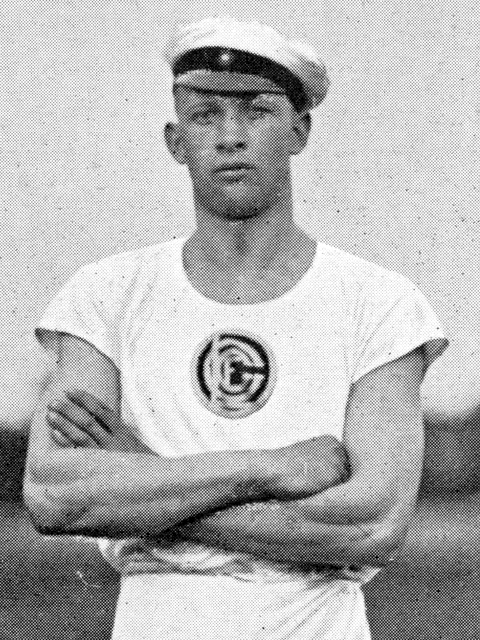
| Roles | Competed in Olympic Games |
|---|---|
| Sex | Male |
| Full name | Gustaf Richard Mikael "Gösta"•Holmér |
| Used name | Gösta•Holmér |
| Nick/petnames | Gösse |
| Born | 23 September 1891 in Djursdala, Vimmerby, Kalmar (SWE) |
| Died | 22 April 1983 (aged 91 years 6 months 29 days) in Stockholm, Stockholm (SWE) |
| Measurements | 185 cm / 84 kg |
| Affiliations | Upsala SIF, Uppsala (SWE) |
| NOC |  Sweden Sweden |
| Medals | OG |
| Gold | 0 |
| Silver | 0 |
| Bronze | 1 |
| Total | 1 |
Competing in track and field Gösta Holmér was an all-round athlete who won ten Swedish titles in three different sports and an Olympic bronze medal. Holmér competed in the decathlon at the 1912 Stockholm Olympics, which became infamous for the disqualification of the event’s winner Jim Thorpe. After years of deliberation Thorpe was finally reinstated as the sole winner of the gold medal in 2022. Two Swedish athletes, Hugo Wieslander and Charles Lomberg were declared as joint-winners of the silver medal, with Holmér winning the bronze medal, despite finishing in fourth place. At the Stockholm Olympics Holmér also finished in eighth place in the pentathlon and competed in the qualification round in the high jump.
After World War I Holmér returned to the Olympics for the 1920 Antwerpen Games where again he finished in fourth place in the decathlon, but this time there was no controversy over the results. He also ran in the 110 metres hurdles where he was eliminated in his heat.
In Sweden Holmér won ten national titles across three disciplines with victory in the pentathlon (1912–13, 1915, 1917, 1920), the decathlon (1913, 1917–19), and the 110 metres hurdles (1913). He also won two bronze medals in the hurdles (1917, 1920), and a bronze in the pentathlon (1918). After his athletics career Holmér worked as a national instructor for the Swedish Athletics Federation from 1925 until his retirement, including being the chief instructor in athletics for Sweden at the Summer Olympics in 1928, 1932, 1948, 1952, and 1956. He also wrote several books about athletics training and developed the technique of fartlek which was initially designed for pacing cross-country runners. Holmér’s son Hans was one of the chief investigators following the assassination of the Swedish Prime Minister Olof Palme in 1986.
Personal Bests: 110H – 15.8 (1914); HJ – 1.85 (1917); Dec – 5889 (1919).
| Games | Discipline (Sport) / Event | NOC / Team | Pos | Medal | As | |
|---|---|---|---|---|---|---|
| 1912 Summer Olympics | Athletics |  SWE SWE |
Gösta Holmér | |||
| 110 metres Hurdles, Men (Olympic) | ||||||
| High Jump, Men (Olympic) | NP r1/2 | |||||
| Pole Vault, Men (Olympic) | ||||||
| Pentathlon, Men (Olympic) | 8 | |||||
| Decathlon, Men (Olympic) | 4 | Bronze | ||||
| 1920 Summer Olympics | Athletics |  SWE SWE |
Gösta Holmér | |||
| 110 metres Hurdles, Men (Olympic) | 3 h2 r1/3 | |||||
| Decathlon, Men (Olympic) | 4 |